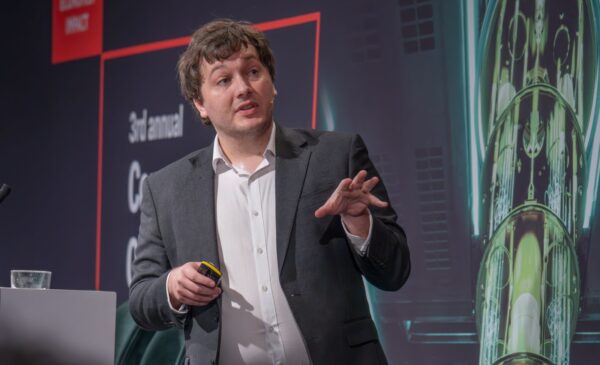A project to develop techniques to miniaturise and enhance the accuracy of optical atomic clocks has been launched in a new research partnership, funded by the Industrial Strategy Challenge Fund, part of UK Research and Innovation.
Hub researchers at the University of Birmingham have partnered in this project, which is led by nanofabrication experts Kelvin Nanotechnology, and also involves product design specialist Wideblue and the University of Strathclyde.
The new clock technology will help improve Global Navigation Satellite Systems (GNSS) location accuracy as well as addressing the scalability of other quantum technologies being developed at the Universities of Strathclyde and Birmingham.
Atomic clocks are the ultimate timekeepers, with the state-of-the-art instruments providing a timing accuracy that it would neither gain nor lose a second in over 30 million years. Due to the high level of accuracy in these instruments, atomic clocks are used to coordinate systems that require extreme precision, such as GNSS. Each satellite network contains multiple atomic clocks that contribute precision timing data, which is decoded to provide location data by effectively synchronizing each receivers’ atomic clocks with those of the satellite.
To achieve such high timing resolution, the atomic clock makes use of ultra-narrow transitions in strontium atoms, providing orders of magnitude better performance than their rubidium counterparts due to narrower atomic features. In simple terms, the narrower the atomic transition the more accurate the atomic clock.

Wideblue’s role in the project is to develop the optical system that will deliver the laser light onto the gMOT chip. Kelvin Nanotechnology will manufacture the gMOT and compact collimation optics designed by Wideblue. The University of Strathclyde will design the gMOT chip, and the University of Birmingham will perform the testing of the prototype optical system.
“We are delighted to continue progress in simplifying and miniaturising atomic clock technology. Accurate, resilient timing will ensure huge improvements for a range of end-user applications, such as satellite-free navigation, ultra-high precision timing for financial trades and exceptionally precise gravimeters for sub-surface detection.”Professor Kai Bongs, Principal Investigator, UK Quantum Technology Hub Sensors and Timing, and Co-Investigator for this project
“Atomic clocks are an integral component in modern technology and impact our daily routines from computing and financial transactions to the navigation systems we use in our phones and cars. As state-of-the-art atomic clocks push new boundaries in precision measurement, we face a new challenge of bringing this complex and large physical apparatus into a compact and user-friendly system where we can make the largest societal and economic impact. Our current collaboration with Wideblue and our academic partners aims to address the scalability of one such atomic clock by reducing the optical constraints into scalable micro-fabricated components as a critical step to bringing laboratory performance out into real world applications.”Dr. James McGilligan, Kelvin Nanotechnology, lead partner on this project
“Small, low cost atomic clocks will be essential as we develop a resilient Position, Navigation and Timing (PNT) infrastructure to support our financial, power distribution and communications services. With support from the Quantum Technologies Challenge in UKRI – part of the UK National Quantum Technologies Programme – we are ensuring that the UK economy and society will benefit from the next generation of quantum devices and be quantum ready.”Roger McKinlay, Challenge Director – Quantum Technologies at UKRI
Notes for editors
University of Birmingham
The University of Birmingham is ranked amongst the world’s top 100 institutions. Its work brings people from across the world to Birmingham, including researchers, teachers and more than 6,500 international students from over 150 countries.
Kelvin Nanotechnology
Kelvin Nanotechnology is an internationally recognised provider of advanced photonics and quantum components. Founded in 1997 and based in Glasgow, Scotland; Kelvin Nanotechnology has built up an extensive global blue-chip customer base and provided services in over 20 countries worldwide.
Proud to be one of the first suppliers of miniaturised quantum components in the market, producing 3D ion traps, grating MOTs and specialised DFB lasers for worldwide customers. Kelvin Nanotechnology drives forward innovation in the fabrication of quantum components to support quantum systems for: information processing and computing, chip scale cold atom systems, sensors, high precision timing and navigation.
Kelvin Nanotechnology is an established comprehensive photonic fabrication service provider for diverse market sectors, and a qualified supply chain partner for multiple global product lines.
Wideblue
Wideblue became part of Pivot International (www.pivotint.com) in April 2018 after being acquired by the Kansas-based company for an undisclosed sum.
Based in Glasgow, Wideblue has a 20-year track record of helping clients take innovative and novel product ideas from the drawing board to prototyping and on to full scale manufacture and commercialisation. The company was established in 2006 as a management buyout from the Polaroid Corporation’s European research and development division working on the company flagship instant camera range and related products. Since then the company has been delivering hundreds of projects for a variety of organisations from start-ups and university spin-outs to multinational corporations. The company is frequently engaged in collaborative projects working with some of Europe’s leading research organisations and universities, especially in the areas of imaging, optoelectronics and bio-medical engineering. The skill set in-house ranges from physics, optics, electronics and software through to mechanical engineering, prototyping, medical devices, manufacture and supply chain management.
Wideblue now has a multi-disciplinary workforce of 20 engineers many of whom have multiple degrees in electronics, physics, product design, engineering and production. The company has won numerous awards for product design including a European Design Award in 2017 for the development of a mobile phone ophthalmoscope for client Peek Vision. It has also won accolades for its work on the I-1 instant digital camera for The Impossible Project.
Livingston-based A2E became part of the Group Pivot International in August 2019. Together with Wideblue the two companies form Scotland’s largest independent product design group.
For further information about Wideblue please visit www.wide-blue.com.
UK Research and Innovation (UKRI)
UK Research and Innovation (UKRI) is the largest public funder of research and innovation in the UK, with a budget of over £8bn. It is composed of seven disciplinary research councils, Innovate UK and Research England.
We operate across the whole country and work with our many partners in higher education, research organisations businesses, government, and charities.
Our vision is for an outstanding research and innovation system in the UK that gives everyone the opportunity to contribute and to benefit, enriching lives locally, nationally and internationally.
Our mission is to convene, catalyse and invest in close collaboration with others to build a thriving, inclusive research and innovation system that connects discovery to prosperity and public good.
UKRI continues to support the research and innovation community to navigate the transitions associated with the exit of the UK from the EU. To keep up to date please visit our dedicated pages. https://www.ukri.org/research/international/ukri-eu-exit/
Industrial Strategy Challenge Fund:
The Industrial Strategy Challenge Fund aims to bring together the UK’s world leading research with business to meet the major industrial and societal challenges of our time. The fund was created to provide funding and support to UK businesses and researchers, part of the government’s £4.7 billion increase in research and development over the next 4 years. It was designed to ensure that research and innovation takes centre stage in the Government’s modern Industrial Strategy. It is run by UK Research and Innovation.




